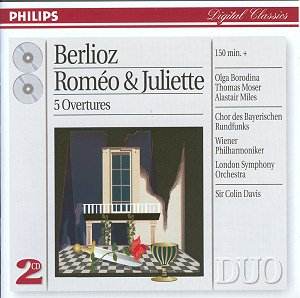For a generation Sir Colin Davis has maintained his
position as the world's finest Berlioz conductor. And since these performances
span a generation, from 1965 to 1993, this 2CD set makes a splendid
tribute to his achievement.
The major work here is the dramatic symphony Roméo
et Juliette, which combines two of the recurring points of inspiration
for this composer: Shakespeare and Italy. The Introduction, with its
images of the street skirmishes of the Montagues and the Capulets, has
that same fast-tempo precision that marked Davis's earlier recording
with the LSO. Here, as elsewhere, he is supported by excellent playing
from the Vienna Philharmonic, who revel in the opportunities that Berlioz
provides, whether in the darting gossamer textures of the Queen Mab
Scherzo or, more still, in the sumptuous expressive warmth of the
Love Scene.
In fact there are but a few caveats in the way of an
unequivocal recommendation. While the recorded sound is clear and, when
necessary, full bodied too, the solo voices do seem to be placed a long
way forward, sounding almost larger-than-life. This is less so in the
complex choral-orchestral finale, but even then the balancing does not
seem entirely natural. There are a few extraneous noises too, which
the remastering process might have done more to eliminate.
The most exciting part of the performance (and of the
dramatic symphony itself?) is Roméo at the Capulet's Feast,
which combines the different identities of the musical material in masterly
fashion. This device is a favourite technique of the composer, and never
was he more successful in employing it. Davis handles these complexities
with a magnificent command of both sonority and rhythmic contrast, and
the results are thrilling.
There are useful booklet notes by John Warrack and
Hugh Macdonald, but alas no texts and translations, which is a sorry
misjudgement. Since Berlioz went to the trouble to use words from Shakespeare,
surely purchasers of so distinguished a performance as this should have
the option of having access to them?
A generous collection of overtures completes the package.
All save Béatrice et Bénédict were recorded
in 1965, but the recorded sound passes muster very well indeed. And
so too the performances, which, as ever with Davis, have an ideal fusion
of rhythmic attack and expressive warmth. Again and again the special
qualities of a piece are projected, and it is hard to believe that some
of these pieces - Les Francs-Juges and Le Roi Lear, for
instance - could have ever been done better.
The Béatrice et Bénédict performance
dates from rather later, in 1977, and again the sound is excellent.
The performance faces its own challenges, with a lighter, more lyrical
character, and again Davis triumphs, as does the LSO.
Terry Barfoot


